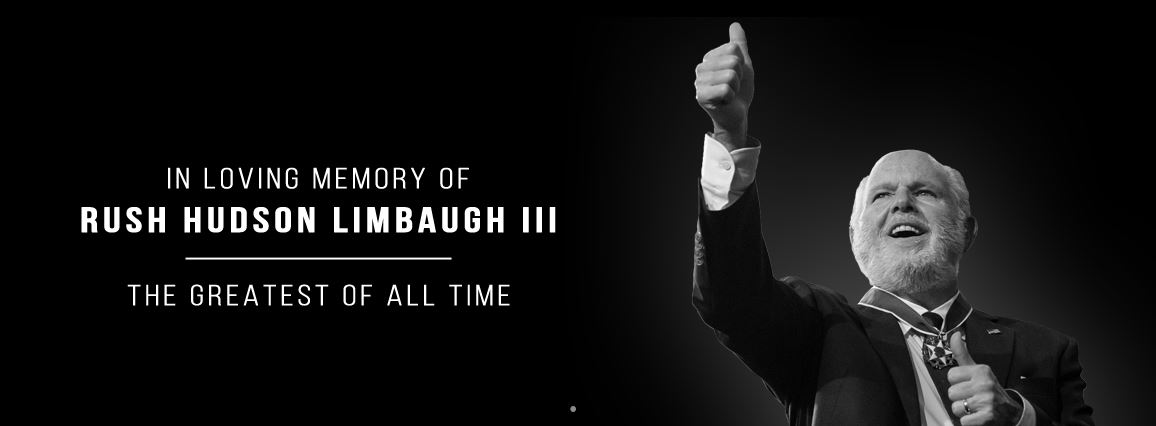 At the age of 70, radio host Rush Limbaugh died of lung cancer early Wednesday morning, after having been diagnosed with Stage 4 lung cancer a year prior.
At the age of 70, radio host Rush Limbaugh died of lung cancer early Wednesday morning, after having been diagnosed with Stage 4 lung cancer a year prior.
Yes, before the question is even asked, Rush Limbaugh was a smoker, first of cigarettes and then of cigars.
So I’d like to take you on a journey to more fully understand and appreciate Rush Limbaugh.
That’s the point of writing this. Because I too was in radio for a number of years, both in AM and FM as a proverbial musical “disc jockey” and also in talk radio, as well as various forms of support to include Traffic Reporter, FM Programmer, News Editor — all at KFBK — and Station Manager, Program Director, Promotions Director, and on-air talent at numerous other stations.
Rush Limbaugh was a radio icon, a great supporter of America, and single-handedly responsible for providing a voice to Conservatives who, heretofore, were mostly voiceless.
America discovered Rush had passed away when his wife Kathryn spoke at the beginning of his Wednesday show, February 17th.
Here is her statement presented on YouTube, if you cannot play the above.
And that is how we discovered that a true American icon had died.
Rush Limbaugh’s last show was on Tuesday, February 2nd, where he was able to provide us with two hours of broadcasting excellence.
For his last words from the EIB studio, start at 1:52:50.
His last words were “see you all next time.” And we will. Just not in the radio format.
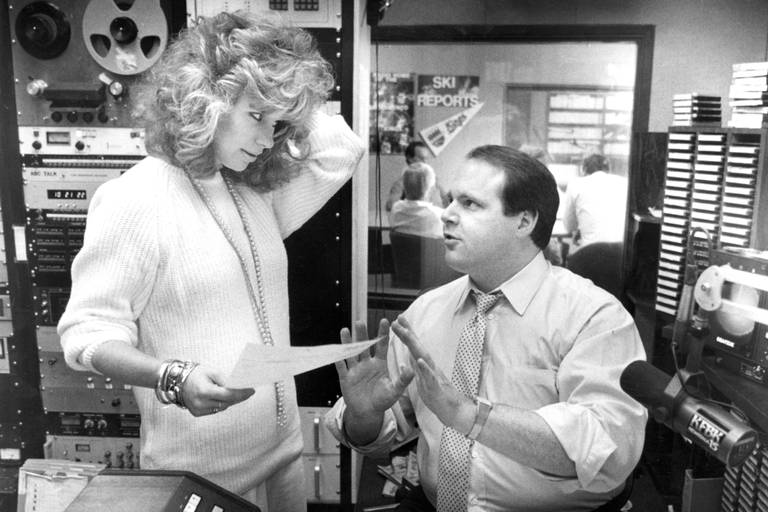 Radio on KFBK in August of 1986. Note the reel-to-reel tape deck, the voluminous cart rack, and the Shure SM7 microphone. Producer Kitty O’Neal talks with the then-35-year-old Rush Limbaugh.
Radio on KFBK in August of 1986. Note the reel-to-reel tape deck, the voluminous cart rack, and the Shure SM7 microphone. Producer Kitty O’Neal talks with the then-35-year-old Rush Limbaugh.
I wrote about Rush on my blog back in 2006:
Rush Limbaugh provided the voice and the venue for those of a Conservative bent and a movement was started. There are those who would credit the political process itself for the Right finding its voice — and certainly the Ronald Reagan years should not be discounted as it was during the temper of these times that Rush Limbaugh worked his way to syndication in 1988.
From there the culture wars may have officially begun. After literally decades of ruling all forms of media and, moreover, its content, liberals were most chagrined to discover AM radio shortly became the bastion of conservatives. It took literally years for the Left to even attempt inroads to AM radio via Air America — and we all know how solvent and powerful Air America is currently.
From there, the internet blossomed. Conservatives took to the net like fish to water. This in turn led to various conservative magazines with links to the internet, Fox News and, most recently, to my venue — the blog. Conservatives are big in the Blogosphere.
As grew the voice of Conservatives, so the Left and liberals felt (because, let’s face it, they were) more challenged. Not everything they said and espoused was accepted by rote. Persons actually had, egads, the temerity to speak up and attempt to refute what the MSM said and wrote. And, egads, it was proven time and again that the MSM occasionally seemed to omit some very salient things from their stories — some people call them facts.
Mind you, this is me in 2006. Only two years after I started my blog in 2004.
Liberals then, during that transition and now (witness this book and others) feature themselves the victims in this heinous and oppressive power grab by the Right.
What happened is this: common people found a voice. They found an outlet for their frustrations. People from the heartland. People from the working class who wanted to get ahead and didn’t want the government to do it for them. People who wanted to be left alone to prosper. People who believe in Capitalism and believe that hard work should yield benefits. People who believe in a higher being as did our Founding Fathers, who believed in justice, in ethics and morals.
So in truth, Conservatives haven’t “fought back” — they just had the gall to voice their beliefs and concerns in a way they never had before.
And that’s what’s threatening to liberals.
It began with a word: information. And the dissemination of and access to information.
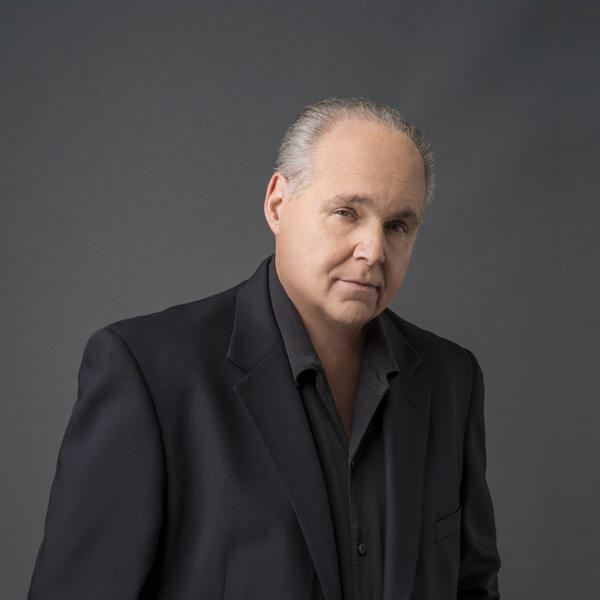 Because it’s all about the power and, for the first time in recent political memory, around 1988, the Democrats didn’t have an absolute stranglehold on the control of information and, consequently, their power diminished. Because, after all, information is power and where politics are concerned, it’s always about power and money.
Because it’s all about the power and, for the first time in recent political memory, around 1988, the Democrats didn’t have an absolute stranglehold on the control of information and, consequently, their power diminished. Because, after all, information is power and where politics are concerned, it’s always about power and money.
When did this begin? What dynamic changed the situation?
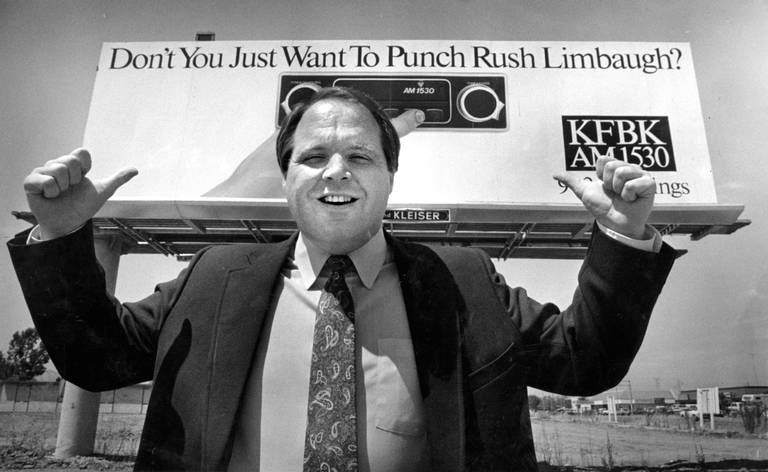 In my opinion, it wasn’t a dynamic, it was a person. One little bitty radio person who started a talk show on KFBK in my home town, Sacramento, Fornicalia. Rush Limbaugh.
In my opinion, it wasn’t a dynamic, it was a person. One little bitty radio person who started a talk show on KFBK in my home town, Sacramento, Fornicalia. Rush Limbaugh.
Rush Limbaugh gave voice to an entire generation, and to generations after, an entire strata of persons who thought they had no voice, who had no idea there were so many others just like themselves. Conservatives began to realize: I’m not alone.
Perhaps I’m simplifying things but I think not; Rush started an actual revolution of conservative self-realization — a very important concept and a base upon which was built subsequent generations of conservative talk show hosts attempting to capitalize on Rush’s success, his cash and, more importantly, fundamentally conservative leanings.
Rush Limbaugh created, particularly in 1988 when his national syndication took off, a starting point for a trend that has mutated into an entirely new paradigm of how we, as Americans, access and process our news and information. And how we have become much more politically aware of what goes on about us.
Make no mistake: Leftist dogma is every bit a religion; Leftists believe the greatest enemy is the United States. We already know how that goes. We saw it with the Leftist-Anarchist Summer of Hate in 2020.
So I submit that where we are now is because, in great part, to Rush Limbaugh. Not in a negative fashion, but in a positive fashion.
Because if Conservatives never found a voice, the Republicans would be in even worse, smashed, pounded, shape than they are now. And moreover, Conservatives, as individuals, as groups, would possibly have continued to evolve at a much slower pace.
Rush Limbaugh is that important to two critical areas:
- The format of radio — as an effective communications tool which could, simultaneously, inform, entertain, and poke fun, and
- Republicans and Conservatives finding their own voice and, once found, using that voice to advance Conservative thought and agendas
So make no mistake, Rush Limbaugh was a Republican but — then — a Conservative mover and shaker.
I tried to think of all the bullet points that would be applicable to Rush Limbaugh, otherwise I’d simply have to write a book. Here goes:
- It could be said that Rush Limbaugh revitalized all of AM radio, which had been drying up courtesy of the FM radio challenge.
- As AM radio was “dying” Limbaugh single-handedly brought it back during what might be considered “the worst of times” for Conservatives as President Clinton was in office in 1992 — despite that his listenership exploded.
- I could say that without Limbaugh there might not have been House control in 1993, as Speaker Newt Gingrich confirms.
- He made politics fun, with parodies of himself and others.
- Just as he was eternally optimistic, he showed us all that, overall, Conservatives are much more optimistic, happy and, more importantly, oriented towards creativity and building.
- He emphasized that contrast so it became obvious that Leftists are negative, unhappy, and focus on destruction.
- He emphasized that America is fundamentally decent, good, caring and charitable.
- He shared some characteristics with President Trump, insofar as he was the initial outsider, a trend setter, who spoke his mind and was attacked for it.
- He said, of the American people, “simply get out of their way and let them triumph.”
- Limbaugh was self-taught. He had no college. He failed any number of times and kept going, persevered, and got better and more facile with each radio job.
- Rush Limbaugh paved the way for Fox News, which went live in October of 1996.
- It could be said he cleared the way for President Trump — whom he supported.
- His clear key was: “I simply validated what everyone already felt.”
So who was “everyone” to Rush Limbaugh? Was it the elites? I submit: No. It was the same people for whom President Trump fought. The average working man or woman, who pulled a wage, paid taxes, whose “paint job” didn’t matter — but who was voiceless, ignored, used like a Kleenex and then thrown away first by Demorats and then by Republicans today — which is more than abundantly clear.
What were some of the attributes that you felt Rush Limbaugh possessed?
And what did Rush Limbaugh mean to you?
For that matter, what does radio in general mean to you?
But things didn’t just start at KFBK in Sacramento. It took Rush Limbaugh twenty years to even get there. And “there” was in fact the “50,000 watt flame thrower” of AM radio stations, as KFBK was licensed back when AM stations could be licensed for 50,000 watts of power.
Limbaugh dropped out of college in 1971 and then was subsequently fired from four radio stations. He got involved with sales with the Kansas City Royals in 1979, then went back to radio in 1983. He was fired after a year then, two weeks later, got hired by KFBK to replace Morton Downey Jr, who called a local politician a “chink.”
Here’s a Rush Limbaugh aircheck from 1974, at station KQV in Pittsburgh, Pennsylvania.
Limbaugh’s first show on KFBK was October 14th of 1984. An ominous year, yes? 1984?
But it was the repeal of the Fairness Doctrine—which had required that stations provide free air time for responses to any controversial opinions that were broadcast—by the FCC on August 5, 1987, meant stations could broadcast editorial commentary without having to present opposing views.
Daniel Henninger wrote, in a Wall Street Journal editorial, “Ronald Reagan tore down this wall (the Fairness Doctrine) in 1987 … and Rush Limbaugh was the first man to proclaim himself liberated from the East Germany of liberal media domination.”
The end of government-mandated “fairness” — translated: equity. Guaranteed equal outcomes. Not guaranteed opportunity.
Limbaugh failed and failed a number of times. KGO in San Francisco turned him down. But he persevered because doing radio was something he loved, had a passion for.
Limbaugh became syndicated in 1988, left KFBK, and continued on, first to WABC in New York — the proverbial big time — creating millions of listeners per year.
Here is an April 29th, 1993 re-broadcast of Rush Limbaugh from KFBK. This, by the way, was Bill Clinton’s 100th day in office.
From there, any number of controversies occurred.
Limbaugh lasted a few weeks as an ESPN commentator in 2003. Then stated the obvious.
I don’t think he’s been that good from the get-go. I think what we’ve had here is a little social concern in the NFL. I think the media has been very desirous that a black quarterback do well. They’re interested in black coaches and black quarterbacks doing well. I think there’s a little hope invested in McNabb and he got a lot of credit for the performance of his team that he really didn’t deserve. The defense carried this team
“Social concern”? Rush Limbaugh nailed “Social Justice” before there was such a thing. And frankly, as history proved, McNabb wasn’t that good. So off of ESPN went Rush.
If you recall, Rush Limbaugh announced that he was addicted to painkillers on air, in 2003.
The radio talk show host said he first became addicted to painkillers “some years ago,” following spinal surgery. However, he added, “the surgery was unsuccessful and I continued to have severe pain in my lower back and also in my neck due to herniated discs. I am still experiencing that pain.”
In April of 2006, Rush Limbaugh turned himself in to authorities, on a warrant issued by the Palm Beach County State Attorney’s office, and was arrested “on a single charge of prescription fraud” His record was later expunged.
Worse yet, for broadcasters — particularly in radio — Rush Limbaugh revealed in 2001 that he was suffering from rapid-onset hearing loss as a result of a rare condition called autoimmune inner ear disease (AIED).
Could a common painkiller have contributed to Rush Limbaugh’s well-known hearing loss?
Research findings suggest the radio talk-show host’s apparent addiction to Vicodin could be the culprit behind his mysterious attack of deafness two years ago.
Doctors over the past several years have reported dozens of cases of Vicodin addicts who became deaf and, in some cases, only regained their hearing with the help of cochlear implants such as the ones received by Limbaugh.
“It’s pretty clear that there is this association,” says Dr. Jeffrey Harris, an ear specialist at the University of California, San Diego Medical School. “The ear is sensitive to drugs, and this particular association with Vicodin has become more relevant as people are getting their hands on it as a recreational drug.”
However, the full extent of the problem isn’t known, and researchers aren’t sure how painkillers may harm the ear in the first place.
How frightening it must have been to lose one’s hearing in radio.
He was diagnosed in May of 2001 and told his listeners in October that he was almost entirely deaf as a result of an autoimmune inner-ear disease. He said he had lost 100 percent hearing in his left ear and 80 percent in his right ear.
He successfully had a cochlear implant placed in his left ear to restore his hearing. He announced in January 2002 that he could hear his own radio show “for the first time in nearly four months via a medical marvel.”
Until then, he relied solely on a TelePrompTer and his staff’s assistance to understand his callers.
Did anyone listen to Rush during his days of using a TelePrompTer? That’s extremely difficult yet Rush continued. He persevered. Like Dr Donald D Rose at KFRC in San Francisco.
Despite his cheerful persona, Rose suffered over three decades of debilitating pain from assorted medical problems. In 1972, he underwent a botched heart surgery, which caused chronic knee infections that required 11 more operations and led to his losing his kneecap. He broadcast his daily radio show flat on his back from his home hospital bed for months. In 1984, after a fall made the knee problems worse, he had the damaged leg amputated.
Perseverance. Dogged determination. Doing what you love, with passion.
But let’s talk about the risk, reward, and the work.
Because the Rush Limbaugh gig was three hours of talk radio with commercial breaks, for 33 years. In that amount of time he had no guests. Correct. Zero guests to take some of the time and weight from your shoulders — with some exceptions like the president and other difficult “gets.”
What Rush Limbaugh had was an endless, cogent, insightful, logical narrative — day after day, week after week, year after year. Quality broadcasting for 33 years.
And he made is seem completely effortless, so smooth, so seamless. But he definitely believed in what I believe: Show Prep.
Some don’t do show prep.
Joe Concha, media pundit, wrote:
Not Rush. The man was notorious for prepping. He also was exceptional at effortlessly weaving narratives. More importantly, he made you look at the same story everyone else was discussing from an angle you hadn’t considered. That made The Rush Limbaugh Show appointment listening, the kind that made you sit in a parking lot long after reaching your destination to hear Rush finish his point.
His secret? The old military training rule: “The more we sweat in training, the less we bleed in war.” Your average ta
lk radio host wings it by showing up, flipping through a newspaper and depending heavily on callers.
As radio hosts know: always have a Plan B, a Plan C, D, and E. Because seldom does all go as planned.
Many people hung onto the cape of Rush Limbaugh — including Sean Hannity, Mark Levin, Dennis Prager, Hugh Hewitt, and many, many, more — to include myself and hundreds of other internet show hosts.
You would think that, with this amount of seniority and dollars, Rush Limbaugh would have been an Ego Shock Missile — but when meeting Rush, many were a bit taken aback by how quiet and almost shy he was. One of his quotes was “I socially distanced before it was fashionable.”
Not like a Michael Savage, whose line of “Borders, Language, and Culture” resonates massively — in other words, a great message. But in my opinion, one of the harshest and worst of messengers imaginable. Savage goes through producers like some people change underwear.
Not Rush. Kit Carson was around for years until his passing from cancer at 58, in 2015. And few know this his producer of many years, “Bo Snerdley,” is actually a gracious and facile man named James Golden, a black Republican, who has been Rush’s call-screener, Producer and Engineer since about 1992, beginning with Limbaugh’s TV show.
Here, Rush Limbaugh is interviewed on the CBS show “60 Minutes” by Steve Kroft in 1991.
And this is Rush speaking at CPAC — the Conservative Political Action Conference — in 2009.
And this is Rush Limbaugh’s last broadcast of 2020, on December 23rd.
Here, Rush Limbaugh receives the highest honor the country can bestow upon a civilian, the Presidential Medal of Freedom, delivered by President Trump and placed by First Lady, Melania Trump — at the State of the Union Address, February 4th of 2021.
We then received the news of Rush’s passing just yesterday, after having been diagnosed with Stage 4 lung cancer on January 20th of 2020.
Leftists then commenced to spit on Rush Limbaugh, of course, because all Demorats and Leftists can do is destroy.
But when they spit on Rush, that means they are all spitting on you and me. Look.

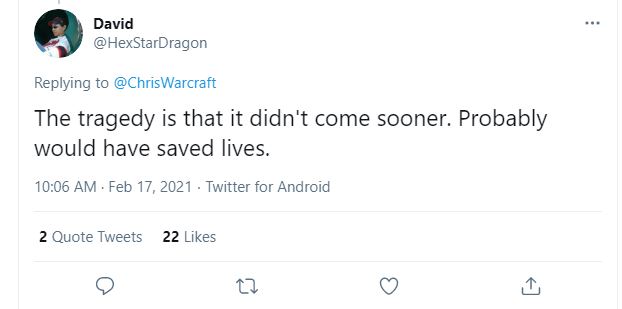


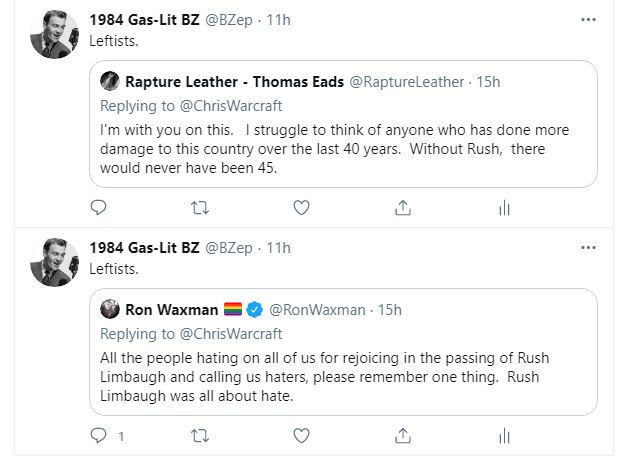
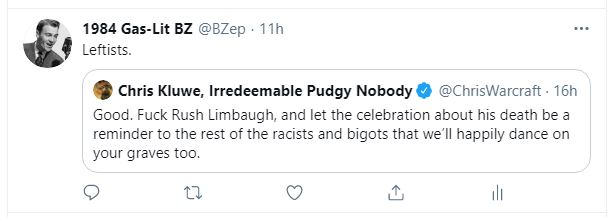
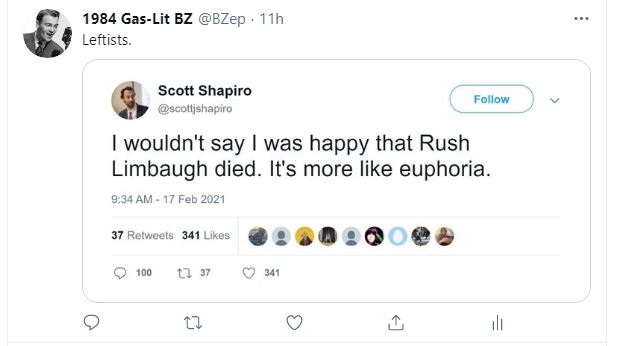 If you want to read filth, read what the Huffington Post (now owned by Buzzfeed) wrote after Limbaugh’s passing here.
If you want to read filth, read what the Huffington Post (now owned by Buzzfeed) wrote after Limbaugh’s passing here.
Rush Limbaugh, Bigoted King Of Talk Radio, Dies At 70
Limbaugh saturated America’s airwaves with cruelty and conspiracies, amassing millions of listeners and transforming the Republican Party.
The accolades rolled in, the testimonies, the stories. Mary Steyn wrote a beautiful tribute here on his website.
Throughout his entire time on air, there were genius GOP consultants who, in reaction to any electoral setbacks, would insist that what the GOP needed to do was come up with a way to ditch Limbaugh. As I said on air many years ago: Really? For almost a third of a century, Rush’s audience was over half the total Republican vote. How many do all you genius “Republican reformers” bring to the table? I’ve recounted previously the first time I was asked to guest-host, back in 2006, when I happened to be down in Australia and the Prime Minister, John Howard, asked me to some or other event a day or two hence. And I politely declined, saying I had to get back to America to host The Rush Limbaugh Show. “I hear that’s a pretty big show,” said the PM.
“Yeah,” I replied. “Twenty-five, thirty million listeners.”
“‘Strewth,” said Mr Howard. “Rush has more listeners than we have Australians.”
Indeed. And all these GOP clever-clogs never explain, once you throw Rush and his millions overboard, what’s going to replace them.
Indeed.
What are some of things Rush said?


 What are your final thoughts on Rush Limbaugh?
What are your final thoughts on Rush Limbaugh?
Let’s go back a bit.
Rush Limbaugh used to say he had “talent on loan from God.”
Mark Steyn wrote the best finalizing sentence in his article praising Rush.
To modify Rush’s tag line: Talent returned to God.
Perfect.
BZ


He will be missed by all us ‘little people’… May he rest in peace. Well said, BZ, WELL SAID!
Thank you very, very kindly, NFO.
BZ
I started listening to him religiously in the late 1980’s when he was broadcasting on a little no-power station (WBBM) out of Belleville, IL, a St. Louis suburb. Rush’s dream, since he was from a little town an hour’s drive from STL was to broadcast over the airwaves via the “50,000 watt blowtorch” that was KMOX St. Louis. His popularity grew to the point where he was trouncing KMOX in that time slot, and they were forced to steal him from WBBM and put him in that slot. I continued to listen to him for a while, but finally realized I was always in an echo chamber, and stopped.
Three hours daily, never missing a beat, and always entertaining.
He is irreplaceable.